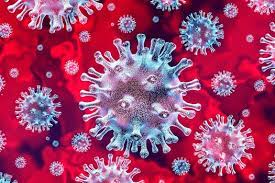South Korea’s daily new Corona virus cases sharply bounced back to the 1,700s on Wednesday as the highly transmissible delta variant weighs on the country’s virus fight during the summer vacation season.
The country added 1,725 COVID-19 cases, including 1,664 local infections, raising the total caseload to 203,926, according to the Korea Disease Control and Prevention Agency (KDCA).
The latest tally marked a sharp rise from 1,218 cases on Monday and 1,200 cases on Tuesday.
Daily cases usually drop over the weekend and rise later in the week as more people get tested.
The daily caseload has remained above 1,000 since July 7, due to outbreaks centred in the greater Seoul area. It reached a peak of 1,895 on July 28.
Two additional COVID-19 deaths were reported, raising the death toll to 2,106.
The fatality rate came to 1.03 per cent.
A medical worker takes a swab sample to test for COVID-19 at a drive-thru screening centre in northern Seoul on August 4.
The current wave of the pandemic has yet to come under control as the growing number of travelers in the summer season and the more infectious delta variant put the country’s virus battle on edge.
South Korea has reported 2,109 more cases of four major contagious variants over the past week, including 1,928 cases of the delta variant.
All of the 272 service members of the anti-piracy Cheonghae unit who contracted the coronavirus and were airlifted home last month after conducting missions in waters off East Africa are presumed to have been infected with the delta variant, according to the KDCA.
So far, 64 of them have been confirmed to have been infected with the variant.
Health authorities also confirmed on Tuesday the country’s first two cases of the delta plus variant, considered a sublineage of the delta variant.
To slow down the spread of the virus, South Korea has implemented the highest level of antivirus curbs in the Seoul metropolitan area, which is set to run through Sunday.
The measure included a ban on the gathering of more than two people after 6 pm, the toughest measure ever imposed by authorities since the outbreak of the COVID-19 pandemic here.
Areas outside the greater capital region were under Level 3, which allows gatherings of up to four people in the evening, but some regional governments have adopted Level 4 distancing measures.
Authorities have been warning they could impose further enhanced measures should the number of daily cases continue to rise throughout this week.
Prime Minister Kim Boo-kyum said the government would decide on Friday whether to extend the virus restrictions and make possible adjustments.
Health authorities said in a daily briefing that there were currently no plans to change the restrictions on private gatherings as they play a key role in the distancing scheme.
Since the country kicked off its vaccination programme in late February, a total of 20.17 million people, or 39.3 per cent of the country’s 51.3 million population, have received their first shots of COVID-19 vaccines.
Around 14.2 per cent, or 7.29 million people, have been fully vaccinated, according to the KDCA data.
While the country has so far focused on offering vaccines to seniors and other priority groups, including medical workers and military officials, vaccines are scheduled to reach the younger population later this month.
Around 18 million people aged 18-49 will receive their first jabs of vaccines from Pfizer and Moderna from August 26 to September 30, under the government’s inoculation blueprint.
The country aims to administer a single vaccination shot to 36 million people, or 70 per cent of its population, by September with hopes of reaching herd immunity in November.
So far, 121,565 cases of post-vaccination side effects have been reported, though 95.1 per cent of them were found to be mild symptoms, such as muscle pain and fever.
There have been 439 deaths following vaccination.
Health authorities added in the briefing that they were wrapping up talks to introduce around 50 million doses of mRNA vaccines next year.
The country has so far secured 193 million doses of vaccines for this year from Pfizer, Moderna, AstraZeneca, Janssen, and Novavax.
Of the newly confirmed domestic cases, 479 were from Seoul, 474 from the surrounding Gyeonggi Province, and 83 from the western port city of Incheon.
Imported cases, which also include South Korean nationals from overseas, came to 61.
The total number of people released from quarantine after making full recoveries was 179,123, up 1,214 from a day earlier.
The number of patients in critical condition came to 329, down two from the previous day.

